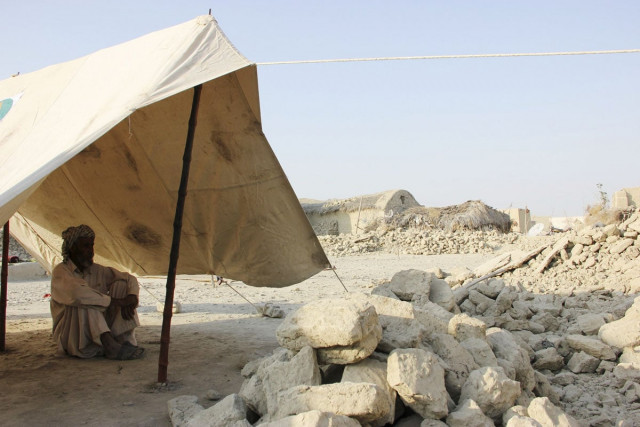Starting from scratch: UN keen to rebuild Balochistan
The UN works closely with local NGOs owing to security risks, says coordinator.

The UN works closely with local NGOs owing to security risks, says coordinator. PHOTO: REUTERS/FILE
With nearly 400 dead and thousands left homeless after a devastating earthquake in late September, winter in the Awaran district of Balochistan is going to be chillier than the expected low temperatures.
To assist the government in its rehabilitation drive for the 200,000 poverty-stricken people of Awaran, the United Nations (UN) pledges to provide its expertise in rehabilitation.
“The people who suffered in the earthquake are poor and vulnerable,” said UN Pakistan Resident Coordinator Timo Pakkala, in an exclusive interview to The Express Tribune. He acknowledged the government’s response to the tragedy, but emphasised that despite challenges, the UN has been involved from the first day.
The UN delegation was recently in Quetta, where it hopes to set up a steering committee in order to effectively coordinate relief and rehabilitation work with the provincial government. In his meeting with the chief minister on Balochistan’s development programme, Pakkala said the delegation urged the government to make use of the UN’s “special expertise” available for rebuilding houses in earthquake-hit areas.
The hidden helping hand
While Pakkala feels lack of education, malnutrition and food insecurity are major concerns for the UN in Pakistan, he admits that Balochistan in particular has its own set of challenges, as the UN has to maintain a low profile.
Foreigners cannot travel outside Quetta without obtaining security clearances, and are mostly restricted to working out of the Serena Hotel due to risks. “It takes time to get security clearances, but using local organisations is a good way to implement some of the programmes,” said Pakkala.
To execute its plans effectively, UN agencies are working closely with the Pakistan government and are ready to extend all the support that is necessary, he added.
Another hurdle came with the 18th Amendment, after which UN agencies were required to work closely with provincial instead of federal administration on its programmes in social sectors.
Pakkala said that there are 19 UN organisations working in Pakistan which have to work in a coherent manner with provinces as well as local organisations.
Priority areas of UN programme
• Equitable access and use of quality services by vulnerable and marginalised populations Inclusive economic growth through development of sustainable livelihoods
• Increased national resilience to disasters, crises and external shocks
• Strengthened governance and social cohesion
• Food and nutrition security for the most vulnerable
Published in The Express Tribune, November 30th, 2013.



















COMMENTS
Comments are moderated and generally will be posted if they are on-topic and not abusive.
For more information, please see our Comments FAQ